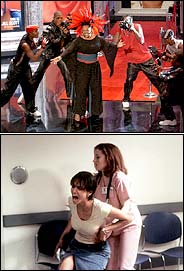| Want to send this page or a link to a friend? Click on mail at the top of this window. |
| Posted October 19, 2003 |
Class With the 'Ph.D. Diva' |
| __________________________________ |
| Tricia Rose, Scholar and Author, Turns a Critical Eye on Hip-Hop, Sexuality and Cultural Images of Blacks |
| By FELICIA R. LEE |
sANTA CRUZ, Calif. — Tricia Rose's imitation of a white girl acting like a black girl — hand on hip, an exaggerated swivel of her neck — sent cascades of laughter through the class. It was Ms. Rose's first lecture of the year in an introductory African-American studies course, and her departure from professorial decorum was welcome after nearly an hour of sober statistics about slavery and rapid-fire provocations about race.
"What's the difference between minstrelsy and black behavior, black culture?" Ms. Rose asked the class of about 125, waving her hands as she paced, her dark curls shaking. The students were crammed into a careworn auditorium with high wooden beams and minimal lighting. You would have no idea that the setting in this city was a sunny, hilly campus, dotted with redwood trees.
 |
 |
|||||
| Susan Ragan for The New York Times | Getty Images, top photo; Jeanne Louise Bulliard/Lions Gates Films | |||||
| Tricia Rose by a beach near her house in Santa Cruz, Calif. | Tricia Rose praises the work of the hip-hop artist Jill Scott, above, but sees the role played by Halle Berry, below, in "Monster's Ball" as perpetuating images of black women as dysfunctional. |
Can you buy "Puerto Rican pants" or an African-American dress to be racially transformed? Professor Rose asked the students, who were mostly white. Is culture a set of practices or has it become so commodified that it can be acquired like clothing? Ms. Rose's performance was prompted by an article in The New York Times about a new television sitcom starring Whoopi Goldberg, in which a white female character adopts the mannerisms, speech and dress of a black woman steeped in hip-hop culture.
But here in the flesh is Tricia Rose — native New Yorker, prep school and Ivy League graduate, biracial child of working-class parents — a woman who really knows hip-hop culture. Ms. Rose is widely recognized as the first person in the country to write her Ph.D. dissertation on hip-hop. (That was in 1993 at Brown University.)
Her dissertation morphed into a widely acclaimed first book, "Black Noise: Rap Music and Black Culture in Contemporary America" (Wesleyan University Press, 1994). That year Ms. Rose was also co-editor of a book on youth music and culture. Her articles and lectures have earned her the moniker of rap's reigning "Ph.D. Diva"' as she holds forth on black culture, politics and sex in places as diverse as the Op-Ed page of The Times and Essence magazine.
| __________ |
"The stories we know help us see who we are." |
| __________ |
Ms. Rose moved to the University of California at Santa Cruz last year and in July was named chairwoman of its American Studies department, after teaching for nine years in the Africana Studies program at New York University.
This spring she published her second book, "Longing to Tell: Black Women Talk About Sexuality and Intimacy" (Farrar, Straus & Giroux), the first compilation of black women's oral histories about all aspects of sexuality. It has been applauded by scholars like Henry Louis Gates Jr., chairman of African and African-American Studies at Harvard. Mr. Gates said black sensitivity to stereotypes of hyper-sexuality has too often meant silence on sexuality or excessive policing of it in popular culture and among scholars.
Ms. Rose, 41, said her second book is not simply a departure from hip-hop but a continuation of her fascination with representations of black women and men. In the same way that "Black Noise" brought together the social criticism, history and aesthetics reflected in the music of the post civil rights generation, "Longing," has a bigger mission than publicizing women's sexual experiences: losing virginity, sexual abuse, love.
"This book began as an attempt to answer a scholarly question: how has the history of race, class and gender inequality in this country affected the way that black women talk about their sexual lives?" Ms. Rose wrote in the foreword.
She herself interviewed the 20 women featured, choosing them from a range of ages, classes and experiences. Using pseudonyms, they discuss how skin-color distinctions among blacks shaped their lives, as well as discrimination and sexual harassment by men of all colors.
The only general conclusion that Ms. Rose draws from the stories is that many of the issues the women discuss, like being considered "exotic," cannot be untangled from the larger context of economic and sexual exploitation of black women and men, sexism and sexual myths.
"The stories we know help us see who we are," Ms. Rose said in her fast, urgent way, her gaze never drifting from behind metal-rimmed glasses. She was sitting over a mug of coffee in a funky, fashionable downtown restaurant. "If we don't take those stories seriously and understand them as part of our social and political formation, then we may be increasingly manipulated in ways we may not want to be."
From her perch, the stories are bleaker than ever. She still listens to a lot of hip-hop, a genre she deeply appreciates despite its warts and contradictions. But straying from the music's roots in alienation, the narratives and videos of today's best-selling commercial hip-hop are more misogynistic and more infected with brutal images of black masculinity, she said. The pimp is a recurring trope, reflecting black needs for power and control of women and white fantasies about black sexuality and violence.
Hollywood is no better. She was particularly appalled and baffled by Queen Latifah's performance this year in "Bringing Down the House," in which she plays a convicted bank robber who utters lines like "Who dat?" and is a vulgar mess overall. Ms. Rose lauded Queen Latifah in "Black Noise" for her independence and talent.
Halle Berry and Denzel Washington won historic Oscars in 2002, but it was no coincidence, Ms. Rose said, that Ms. Berry played "a pathologically dependent dsyfunctional mother who's sexually excessive in many ways" and that Mr. Washington portrayed "a cracked-out renegade cop who's basically a gangster."
Ms. Rose concedes that some lovely representations seep through hip-hop, mentioning, for example, those of the singer and performing poet Jill Scott. Still, she is concerned about those images driven by a legacy of "scholarly, cultural and political representations around black sexual dysfunction, around violence, around deviance," she said. "So when we play those roles, it seems real." Because they feel authentic and familiar, they are reproduced over and over, even when black artists have some creative control, she added.
Ms. Rose said she believed that many rap artists had the talent to take on more positive and nuanced themes but that they feared that those images wouldn't be as popular.
George Lipsitz, one of Ms. Rose's Ph.D. advisers, recently joined the American Studies faculty at Santa Cruz, largely because of his admiration for her. Mr. Lipsitz said he was intrigued by her ambitions to develop a graduate program called Comparative United States Studies and to create "research clusters" of students and faculty members to work on intellectual questions.
"She has an extraordinary ability to mix social criticism, social history and cultural criticism and an advanced study of aesthetics, and to see how they all fit together," Mr. Lipsitz said. "She understood that hip-hop was the most valuable archive of what happened to black youth in the 70's and 80's."
Tricia Rose spent the first years of her life in Harlem, the child of a courageous marriage of a white legal secretary and a black bus driver. (They wed in the 1950's.) Her mother's white skin prompted curiosity, at the very least, and Ms. Rose recalls that she never met another biracial child until eighth grade, when she entered Dalton, the elite Manhattan prep school. There she was different because of class and race, with a two-hour commute each day from Co-op City in the Bronx. But she was also popular.
While her time at Dalton and then as an undergraduate at Yale were intellectually stimulating, Ms. Rose said she was always aware of how complicated it was to be among the few blacks at such places. It helped that her parents made her and her older brother (also a college professor) feel emotionally secure and challenged them to excel and be independent.
| ________________ |
| A concern that rap itself is influenced by negative racial stereotypes. |
| ________________ |
For now, Santa Cruz, with its temperate climate and slower pace, allows Ms. Rose and her husband of six years, Andre C. Willis, "to develop more of our inner lives," she said. They live downtown, among more than a few transplanted New Yorkers. Mr. Willis is completing a dissertation on the study of religion at Harvard and teaching at San Jose State University.
Although Ms. Rose's latest work has focused on black women's sexuality, she finds that she is still frequently asked to talk about the music, the artists and the video images of hip-hop. And she takes satisfaction in that. After all, she remembers when some of her professors at Brown warned her that hip-hop was fleeting and certainly not intellectually serious. Now, she said, "it is the lingua franca for talking about race and popular culture."
Copyright 2003 The New York Times Company. Reprinted from The New York Times, Arts & Ideas, of October 18, 2003.
| Wehaitians.com, the scholarly journal of democracy and human rights |
| More from wehaitians.com |